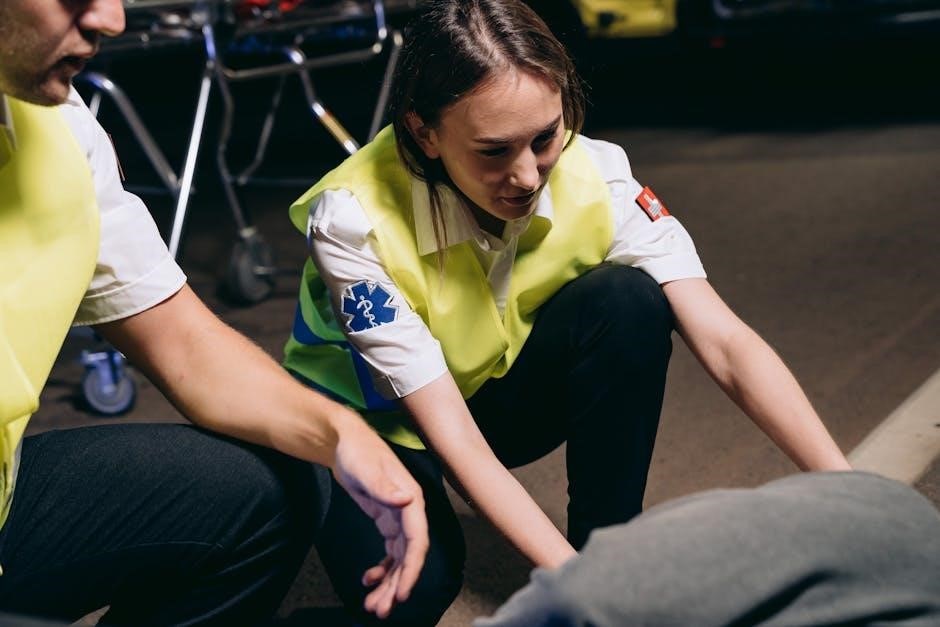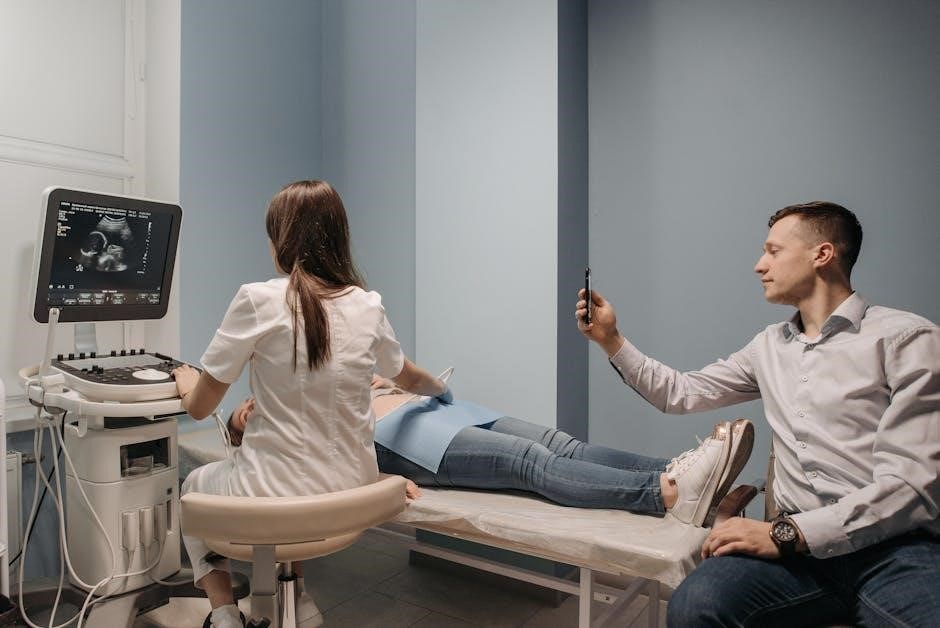Patient Care Technicians (PCTs) play a vital role in healthcare, assisting with daily patient care tasks. Free study guides in PDF format help aspiring PCTs master essential skills efficiently.
1.1 Overview of the Patient Care Technician Profession
The Patient Care Technician (PCT) profession involves providing direct patient care under the supervision of healthcare professionals. PCTs assist with daily activities, monitor vital signs, and prepare patients for medical procedures. They play a crucial role in ensuring patient comfort, safety, and well-being. Key responsibilities include bathing, dressing, and mobilizing patients, as well as maintaining a clean and hygienic environment. PCTs also support medical staff with tasks like drawing blood, performing EKGs, and documenting patient information. This role is essential in hospitals, clinics, and long-term care facilities, making PCTs indispensable in the healthcare system. Their work directly impacts patient outcomes, emphasizing the importance of professionalism and compassion in their daily duties.
1.2 Importance of a Study Guide for Certification
A study guide is essential for aspiring Patient Care Technicians (PCTs) seeking certification. It provides a structured approach to learning, ensuring comprehensive preparation for the exam. Free PDF study guides offer accessible resources, covering critical topics like patient care fundamentals, infection control, and medical terminology. These guides often include practice questions and flashcards, helping candidates assess their knowledge and identify areas for improvement. By following a study guide, individuals can build confidence and competence, ensuring they meet certification standards. This resource is particularly valuable for those balancing education with other responsibilities, offering flexibility and affordability. Utilizing a study guide maximizes preparation efficiency, enabling PCTs to excel in their roles and deliver quality patient care.

Importance of Certification for Patient Care Technicians
Certification enhances credibility and career prospects for Patient Care Technicians. It validates skills in patient care, safety protocols, and medical procedures, ensuring high-quality healthcare delivery.
2.1 Why Certification is Crucial in Healthcare
Certification is vital in healthcare as it ensures that Patient Care Technicians meet standardized competencies. It validates their ability to perform critical tasks safely and effectively, enhancing patient trust and outcomes. With free study guides, aspiring PCTs can prepare thoroughly for certification exams, demonstrating their mastery of essential skills like phlebotomy, EKG, and infection control. Certification also aligns with healthcare employer requirements, providing a competitive edge in job markets. By adhering to industry standards, certified technicians contribute to delivering high-quality, reliable care, which is fundamental to the healthcare system’s integrity and patient safety.
2.2 Benefits of Becoming a Certified Patient Care Technician (CPCT)
Becoming a Certified Patient Care Technician (CPCT) offers numerous benefits, including enhanced job prospects and increased earning potential. Certification demonstrates a commitment to professional excellence, boosting patient trust and employer confidence. It validates your mastery of critical skills like phlebotomy, EKG, and infection control, making you a valuable asset in healthcare settings. Additionally, certification opens doors to career advancement and specialization opportunities. Free study guides in PDF format provide accessible preparation, ensuring you’re well-equipped for the exam. By achieving CPCT certification, you not only improve your career trajectory but also contribute to delivering high-quality patient care, fostering a sense of personal and professional fulfillment.
Key Topics Covered in Free Patient Care Technician Study Guides
Free study guides cover essential topics like patient care fundamentals, infection control, phlebotomy, EKG procedures, and medical terminology, preparing students for certification exams.
3.1 Patient Care Fundamentals and Safety Protocols
Patient care fundamentals and safety protocols are cornerstone topics in free study guides, ensuring technicians understand essential practices for quality care. These guides cover basics like maintaining a clean and safe environment, proper use of equipment, and infection control measures. They also emphasize patient monitoring, vital sign assessment, and emergency response procedures. Safety protocols are highlighted to prevent accidents and ensure compliance with healthcare standards. Topics such as proper hygiene, handling medical supplies, and patient positioning are also addressed. By mastering these fundamentals, technicians can provide effective care while minimizing risks. Free PDF resources often include real-world scenarios to illustrate key concepts, making learning practical and applicable. These materials are invaluable for building a strong foundation in patient care and safety.
3.2 Infection Control and Medical Terminology
Infection control and medical terminology are essential components of patient care technician training. Free study guides provide detailed insights into infection prevention strategies, including proper hand hygiene, use of personal protective equipment, and sterilization techniques. Understanding medical terminology is crucial for effective communication among healthcare professionals. These guides cover basic terms related to anatomy, diseases, and treatments, ensuring technicians can interpret medical records and follow instructions accurately. Topics like isolation precautions and universal safety protocols are emphasized to minimize the risk of spreading infections. Additionally, the guides often include real-world scenarios to illustrate how terminology applies in practical patient care situations. Mastering these concepts ensures safe and efficient patient care delivery.
3.3 Phlebotomy, EKG, and Clinical Procedures
Free patient care technician study guides offer comprehensive sections on phlebotomy, EKG, and clinical procedures. These guides detail proper venipuncture techniques, ensuring safe and efficient blood sample collection. EKG training covers electrode placement, waveform interpretation, and common arrhythmia identification. Clinical procedures such as vital sign measurement, patient positioning, and wound care are also explored. Step-by-step instructions and visual aids help learners master these hands-on skills. Real-life case studies and practice exercises reinforce understanding, preparing technicians for diverse clinical settings. These resources are invaluable for building the technical expertise needed to excel in patient care roles and succeed in certification exams.

How to Prepare for the Certified Patient Care Technician (CPCT) Exam
Utilize free PDF study guides for effective preparation. Focus on practice exams, study strategies, and time management tips to ensure readiness for the CPCT certification.
4.1 Study Strategies for Success
Effective preparation for the CPCT exam begins with a structured study plan. Utilize free PDF study guides to review core topics like patient care fundamentals and medical terminology. Prioritize active learning techniques, such as highlighting key concepts and creating flashcards for quick revision. Dedicate time to practice questions and mock exams to familiarize yourself with the test format. Focus on weak areas identified through self-assessment. Consistency is key—set aside regular study sessions to build confidence and mastery. Additionally, engage in group discussions or online forums to clarify doubts and gain insights from others. By combining these strategies, you can approach the exam with confidence and achieve success.
4.2 Practice Questions and Mock Exams
Engaging with practice questions and mock exams is essential for exam readiness. Free PDF study guides often include sets of realistic questions that mirror the actual CPCT exam format. These tools help candidates understand the structure, timing, and content distribution of the test. Regularly tackling practice questions improves problem-solving skills and reinforces knowledge of key topics like patient care fundamentals and medical terminology. Mock exams simulate real test conditions, allowing candidates to assess their performance and identify areas needing improvement. Reviewing answer explanations enhances understanding and reduces exam-day anxiety. Consistent practice ensures familiarity with the material and builds confidence, making it a critical component of a successful study routine.
4.3 Time Management and Exam Day Tips
Effective time management is crucial for success on the CPCT exam. Free PDF study guides often include tips on creating a structured study schedule, ensuring balanced preparation across all topics. On exam day, arriving early and staying calm is essential. Practicing mock exams under timed conditions helps build stamina and familiarity with the test format. Reviewing instructions carefully before starting ensures understanding of each question type. Avoiding rushing through answers and allocating time for each section can improve accuracy. Staying hydrated, bringing necessary materials, and maintaining a positive mindset are additional strategies for optimal performance. These tips, combined with thorough preparation, help candidates approach the exam with confidence and maximize their chances of success.

Benefits of Using Free PDF Study Guides
Free PDF study guides offer accessibility, flexibility, and cost-effectiveness, enabling students to prepare efficiently. They provide comprehensive content, complementing traditional resources while reducing financial and environmental impact significantly.
5.1 Accessibility and Convenience of PDF Formats
Free PDF study guides offer unparalleled accessibility and convenience, allowing students to access materials anytime, anywhere. Their portability ensures seamless learning on various devices, from smartphones to laptops, without internet dependency. PDFs are easily searchable, enabling quick navigation to key topics, while features like bookmarks and note-taking enhance study efficiency. This format also supports environmentally friendly learning by reducing paper use. The convenience of PDFs aligns with modern study habits, providing flexibility for students to prepare for exams at their own pace. Their widespread availability makes high-quality educational resources accessible to everyone, fostering equity in learning opportunities.
5.2 Cost-Effective Learning for Students
Free PDF study guides provide a cost-effective solution for students preparing for patient care technician certification. By eliminating the need for expensive textbooks or subscriptions, these resources make high-quality education accessible to everyone. Students can access comprehensive study materials without incurring additional costs, allowing them to allocate resources to other educational needs. The availability of free PDFs ensures that financial constraints do not hinder learning opportunities. This affordability empowers students to focus on mastering essential skills and knowledge, fostering a more inclusive and equitable learning environment. With free PDF guides, aspiring patient care technicians can achieve their goals without financial burden, making their educational journey more manageable and stress-free.

Additional Resources for Patient Care Technician Training
Additional resources for PCT training include online courses, tutorials, and interactive tools. Flashcards and recommended textbooks further enhance learning, offering hands-on practice and real-world application insights.
6.1 Online Courses and Tutorials
Online courses and tutorials are invaluable resources for Patient Care Technician (PCT) training. Platforms like Khan Academy, Coursera, and specialized medical websites offer free and paid courses that cover essential topics such as patient care fundamentals, infection control, and clinical procedures. These courses often include interactive modules, video demonstrations, and quizzes to reinforce learning. For example, the NHA CPCT/A exam prep module provides real-world critical-thinking challenges, while websites like TestPrepReview.com offer free practice questions and flashcards. Additionally, tutorials on phlebotomy and EKG basics are widely available, helping students master technical skills. These online resources are accessible, flexible, and designed to complement traditional study guides, making them ideal for self-paced learning and exam preparation.
6.2 Flashcards and Interactive Learning Tools
Flashcards and interactive learning tools are excellent supplements for Patient Care Technician (PCT) training. Websites like Quizlet and Kahoot offer free flashcards on topics such as medical terminology, infection control, and patient care procedures. These tools enhance memorization and active recall, making complex concepts easier to grasp. Interactive modules, such as those found in the NHA CPCT/A study guide, include real-world scenario challenges that test critical-thinking skills. Additionally, apps like Anki provide spaced repetition systems to optimize learning. These resources are particularly useful for visual and kinesthetic learners, as they engage multiple senses and promote retention. By combining flashcards with practice exams, aspiring PCTs can build confidence and mastery of essential skills.
6.3 Recommended Textbooks and Guides
Several textbooks and guides are highly recommended for aspiring Patient Care Technicians. The “Patient Care Technician Exam Secrets Study Guide” is a popular choice, offering in-depth review material and practice questions. Additionally, the “Patient Care Technician Textbook PDF” provides comprehensive coverage of essential topics like patient care fundamentals, medical terminology, and clinical procedures. These resources are often available for free online, making them accessible to all students. They complement online courses and flashcards by providing detailed explanations and structured learning paths. Utilizing these guides ensures a well-rounded understanding of the material, preparing students for both the certification exam and real-world patient care scenarios.

Final Tips for Achieving Success in the Patient Care Field
Stay updated with medical advancements, build a strong foundation in patient care, and commit to continuous learning. These strategies ensure long-term success and excellence in the field.
7.1 Staying Updated with Medical Advancements
Staying updated with medical advancements is crucial for Patient Care Technicians (PCTs) to deliver high-quality care. Free study guides in PDF format provide insights into the latest techniques and technologies, ensuring PCTs remain informed about best practices. These resources often include sections on new medical procedures, updated safety protocols, and advancements in patient monitoring tools. By regularly reviewing these materials, PCTs can adapt to changes in healthcare standards and improve patient outcomes. Additionally, many guides offer tips on how to integrate new knowledge into daily practice, making it easier for PCTs to stay current without additional costs.
Free PDF study guides also emphasize the importance of continuous learning, encouraging PCTs to pursue further education and certifications. This commitment to staying updated ensures that PCTs remain competent and capable of meeting evolving patient needs in a dynamic healthcare environment. By leveraging these free resources, PCTs can enhance their skills and contribute to better patient care outcomes.
7.2 Building a Strong Foundation in Patient Care
Building a strong foundation in patient care is essential for aspiring Patient Care Technicians (PCTs). Free study guides in PDF format provide comprehensive insights into patient care fundamentals, infection control, and clinical procedures. These resources are designed to equip PCTs with the essential skills needed to deliver high-quality care. By focusing on clear explanations and practical examples, free PDF guides help learners understand the importance of effective communication, empathy, and professionalism in patient interactions. These materials also emphasize the role of PCTs in maintaining patient safety and dignity, ensuring a solid understanding of core responsibilities. Utilizing these guides enables PCTs to build a robust foundation, preparing them for the challenges of the healthcare field.
7.3 Continuous Learning and Professional Development
Continuous learning and professional development are crucial for Patient Care Technicians (PCTs) to stay updated with evolving healthcare practices. Free PDF study guides offer accessible resources for ongoing education, ensuring PCTs remain proficient in patient care fundamentals, infection control, and advanced clinical procedures. These guides often include updates on medical advancements, enabling PCTs to adapt to new standards and technologies. By leveraging these materials, professionals can enhance their skills in areas like phlebotomy, EKG, and patient monitoring. Additionally, interactive tools such as flashcards and online courses complement PDF guides, providing a well-rounded approach to lifelong learning. Investing time in continuous education not only improves job performance but also fosters career growth and adaptability in the dynamic healthcare field.
Free Patient Care Technician study guides in PDF format provide invaluable resources for aspiring professionals, offering comprehensive insights and practical tools to excel in their roles effectively.
8;1 Summary of Key Takeaways
8.2 Encouragement for Aspiring Patient Care Technicians
Embarking on the journey to become a Patient Care Technician is a rewarding path that offers immense growth opportunities in healthcare. With the help of free PDF study guides, aspiring technicians can confidently prepare for certification and excel in their roles. These resources provide a solid foundation, covering essential topics like patient care fundamentals, infection control, and clinical procedures. Aspiring PCTs should embrace this journey, knowing they will make a significant impact on patients’ lives. By dedicating time to study and practice, individuals can build a successful career in this vital healthcare profession. Remember, every step forward brings you closer to helping others and achieving your professional goals.



